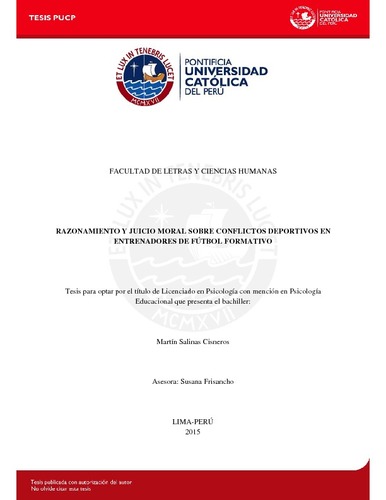| dc.contributor.advisor | Frisancho, Susana | es_ES |
| dc.contributor.author | Salinas Cisneros, Martín | es_ES |
| dc.date.accessioned | 2015-10-01T01:33:46Z | es_ES |
| dc.date.available | 2015-10-01T01:33:46Z | es_ES |
| dc.date.created | 2015 | es_ES |
| dc.date.issued | 2015-09-30 | es_ES |
| dc.identifier.uri | http://hdl.handle.net/20.500.12404/6295 | |
| dc.description.abstract | El fútbol es el deporte más popular del mundo y sus agentes funcionan como modelos para un gran número de personas. A pesar de tener un enorme potencial educativo, este juego se ha convertido en muchos aspectos en un espacio de trasgresión de normas y validación de la trampa y corrupción en búsqueda de mejores resultados deportivos y económicos. Parte importante de dichas conductas ocurre en el terreno de juego, y los entrenadores son frecuentemente protagonistas por la relevancia de su rol como líderes. Por ello, la presente investigación tiene como objetivo describir y discutir los procesos de razonamiento y juicio moral de ocho entrenadores de fútbol formativo en torno al Instrumento de Conflictos Deportivos, el que se construyó para este trabajo. Los principales resultados confirman que existe una prevalencia de razonamientos preconvencionales, en los que se justifica la trasgresión al reglamento o se razona a manera de costo-beneficio, sobre todo para las faltas estratégicas y actitudes de viveza, así como para, en menor medida, el engaño al árbitro. La investigación propone una necesidad de repensar el rol de los entrenadores de fútbol y psicólogos deportivos en la educación moral de los niños y adolescentes, adoptando expresamente una visión de principios morales en la resolución de conflictos. | es_ES |
| dc.description.abstract | Football is the most popular sport in the world, and its agents work as models for a great number of people. Despite it has an enormous educational potential, this game has become in many ways a space for breaking the rules and validating cheating and corruption in order to get better results and economic benefit. An important part of these behaviors occur in the field, and coaches are frequently protagonists for their relevance as leaders. Then, this research has as main objective to describe and discuss the moral reasoning and moral judgment processes of eight youth football coaches when presented with the Sport Conflicts Instrument, which was build for this work. The main results confirm there is a prevalence of preconventional reasoning, in which breaking the rules is justified or reasoned in a cost-benefit way, especially for strategic foul commission, cunning attitude and to a lesser extent, tricking the referee. The research proposes a need to rethink the role of football coaches and sports psychologists in the moral education of children and teens, expressly adopting a vision of moral principles in the resolution of conflicts. | es_ES |
| dc.language.iso | spa | es_ES |
| dc.publisher | Pontificia Universidad Católica del Perú | es_ES |
| dc.rights | Atribución-NoComercial-SinDerivadas 2.5 Perú | * |
| dc.rights | info:eu-repo/semantics/openAccess | es_ES |
| dc.rights.uri | http://creativecommons.org/licenses/by-nc-nd/2.5/pe/ | * |
| dc.subject | Juicio moral | es_ES |
| dc.subject | Fútbol--Aspectos sociales | es_ES |
| dc.subject | Entrenadores de fútbol | es_ES |
| dc.title | Razonamiento y juicio moral sobre conflictos deportivos en entrenadores de futbol formativo | es_ES |
| dc.type | info:eu-repo/semantics/bachelorThesis | es_ES |
| thesis.degree.name | Licenciado en Psicología Educacional | es_ES |
| thesis.degree.level | Título Profesional | es_ES |
| thesis.degree.grantor | Pontificia Universidad Católica del Perú. Facultad de Letras y Ciencias Humanas | es_ES |
| thesis.degree.discipline | Psicología Educacional | es_ES |
| renati.discipline | 313046 | es_ES |
| renati.level | https://purl.org/pe-repo/renati/level#tituloProfesional | es_ES |
| renati.type | http://purl.org/pe-repo/renati/type#tesis | es_ES |
| dc.publisher.country | PE | es_ES |
| dc.subject.ocde | http://purl.org/pe-repo/ocde/ford#5.01.00 | es_ES |






